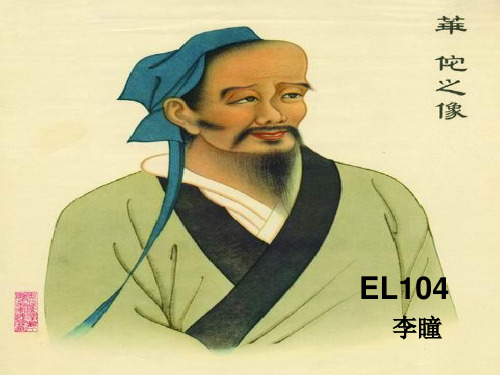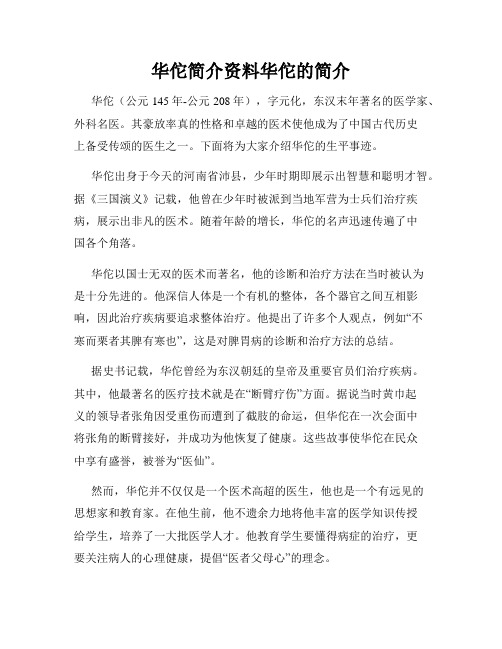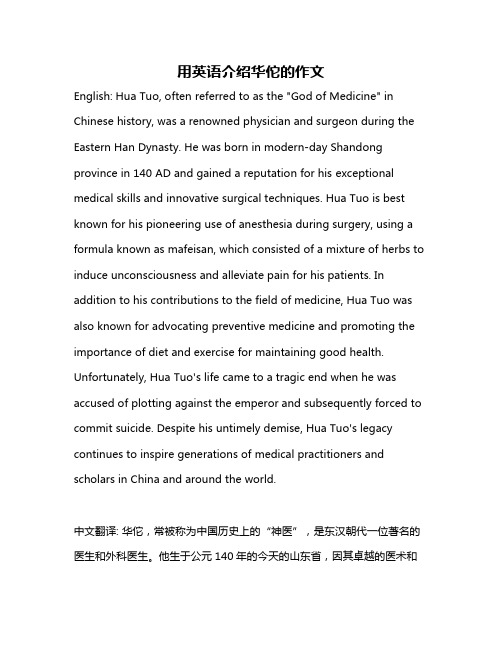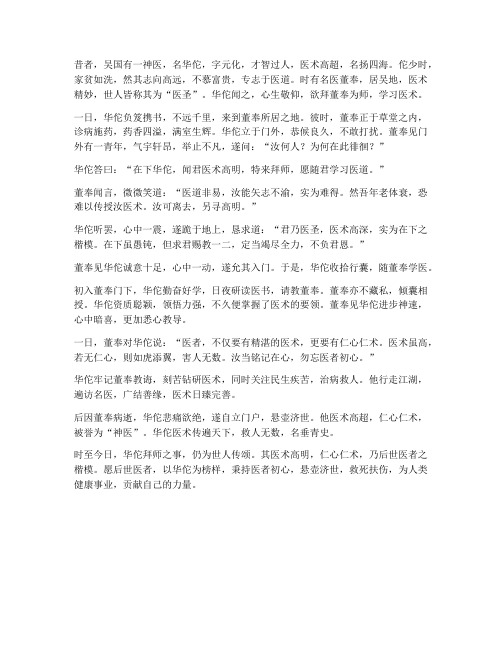华佗中英文简介
华佗生平介绍 中 英双语

EL104
李瞳
Introduction In the ficition -guan yu Success -ma fei san - wu qin xi memory
Hua Tuo was an ancient Chinese physician who lived during the late Han Dynasty and Three Kingdoms era of Chinese history. The Records of Three Kingdoms and Book of Later Han record Hua as the first person in China to use anesthesia . Besides being respected for expertise in surgery and anesthesia, Hua Tuo was famous for his abilities in acupuncture, moxibustion, herbal medicine, and medical exercises. He developed the Wuqinxi from studying movements of the tigers, deers, bears, apes, and birds.
祖意上疗度“华 义的法熟华陀 。一和练陀被 华个健的在认 佗里身医世为 被程方生”是 后碑法的。一 ”人,,尊华位 尊具是重陀神 称有在。在医 为十中华世, “分国佗是受 外重医创一人 科要学造个崇 。鼻的史的高拜
用英语介绍华佗的作文

用英语介绍华佗的作文Hua Tuo, also known as Hua Tu, was a famous Chinese physician who lived during the Eastern Han Dynasty. He is widely regarded as one of the greatest doctors in Chinese history, known for his medical expertise and innovative surgical techniques. Hua Tuo was born in the late Eastern Han Dynasty, around the 2nd century AD, in the state of Nanyang, which is present-day Henan Province in China. He was a skilled physician and surgeon who made significant contributions to the field of medicine during his lifetime. Hua Tuo is perhaps best known for his pioneering work in the field of surgery. He was one of the first doctors in China to perform surgery under anesthesia, using a mixture of wine and herbal extracts to numb his patients before operating on them. This was a groundbreaking development in the history of medicine, as it allowed for more complex and invasive surgical procedures to be performed with less pain and discomfort for the patient. Hua Tuo's use of anesthesia was a major advancement in the field of surgery and helped to pave the way for modern surgical techniques. In addition to his work in surgery, Hua Tuo was also a skilled herbalist and pharmacologist. He was known for his extensive knowledge of traditional Chinese medicine and his ability to create effective herbal remedies for a wide range of ailments. HuaTuo's herbal treatments were highly sought after by patients from all walks of life, and he was renowned for his ability to heal even the most serious and chronic illnesses. His expertise in herbal medicine helped to establish him as one of the most respected doctors of his time. Hua Tuo's reputation as a healer and physician extended beyond his medical skills. He was also known for his compassionate and caring nature, as well as his dedication to his patients. Hua Tuo was said to treat all of his patients with kindness and empathy, regardless of their social status or background. He was known for his gentle bedside manner and his willingness to go above and beyond to ensure the well-being of those under his care. Hua Tuo's commitment to his patients and his genuine concern for their health and happiness made him a beloved figure in the medical community. Despite his many accomplishments and contributions to the field of medicine, Hua Tuo'slife was not without its challenges. During the tumultuous period of the Three Kingdoms in ancient China, Hua Tuo found himself caught in the midst of politicalturmoil and conflict. He was eventually accused of treason and executed by the warlord Cao Cao, who viewed him as a threat to his power. Hua Tuo's untimely death was a great loss to the medical community, and his legacy continued to be celebrated long after his passing. In conclusion, Hua Tuo was a remarkable figure in the history of Chinese medicine, known for his pioneering surgical techniques, his expertise in herbal medicine, and his compassionate approach to patient care. His contributions to the field of medicine have had a lasting impact on the practice of healthcare in China and beyond. Hua Tuo's legacy lives on as a testament to the power of healing and the importance of compassion in medicine.。
华佗简介

华佗华佗是中国历史上第一位创造手术外科的专家,也是世界上第一位发明麻醉剂“麻沸散”及发明用针灸医病的先驱者、创始人。
“麻沸散”为外科医学的开拓和发展开创了新的研究领域。
他的发明比英国的一位化学家( 1847 年)发明的氧化氮、氯仿麻醉剂要早 1500 多年。
比美国的牙科医生摩尔顿( 1846 年)发明乙醚麻醉获得成功更要早 1600 多年。
自幼聪明好学的华佗,一心想做医生,为百姓医病解难。
尤其是他亲眼看见母亲活活被疾病夺去生命之后,他就更坚定了要做一名出色医生的信念。
他靠自己的专心好学和力求上进的毅力,以医林先师为自己的榜样,认真苦读研究医书并把努力专研和大胆的医疗实践相结合。
使他的医术不断提高。
华佗除了医治常见的病症之外,更擅长对外科手术的研究。
他可以用一把小小的手术刀,使许多对自己所患病症已绝望的频死病人,神奇地保全了性命恢复了健康。
在麻醉术发明之前,外科医生为了使病人能够忍受手术刀割的痛苦而想尽办法。
比如有采取放血的方法,使病人处于失血休克状而对疼痛反应迟钝;有的是压迫颈动脉,使病人脑部缺血昏迷,再进行手术。
然而这些办法非常痛苦也有危险。
但是无耐大多数病人还是要忍受着刀割之痛接受治疗。
有些人也就在这难忍的惨痛中离开了人间。
病人的剧痛、惨叫、拼死的挣扎,使外科手术的发展受到了极大限制,也给手术医生带来了烦恼和负担。
为了减轻和排除病人在手术中的恐惧和剧痛,使外科手术能在安静的环境里顺利地进行,华佗经过多次实验、探索、研究发明了一种全身麻醉剂,这就是著名的中药 ---- 麻沸散。
《后汉书》、《三国志》等史书均有记载。
这个有效的止痛办法给病人带来了生存的希望,也为外科医生施展手术技能奠定了基础。
病人在术前只要用酒冲服“麻沸散”,就会收到失去知觉、平静入睡的效果。
手术中不会有恐惧和疼痛发生,这样医生就可以为患肿瘤的病人顺利开刀割除。
对缝合后的切口,华佗还要用外用药膏敷上以防感染,促进刀口愈合。
如此,经过 4--5 天,伤口即可以痊愈。
华佗简介资料华佗的简介

华佗简介资料华佗的简介华佗(公元145年-公元208年),字元化,东汉末年著名的医学家、外科名医。
其豪放率真的性格和卓越的医术使他成为了中国古代历史上备受传颂的医生之一。
下面将为大家介绍华佗的生平事迹。
华佗出身于今天的河南省沛县,少年时期即展示出智慧和聪明才智。
据《三国演义》记载,他曾在少年时被派到当地军营为士兵们治疗疾病,展示出非凡的医术。
随着年龄的增长,华佗的名声迅速传遍了中国各个角落。
华佗以国士无双的医术而著名,他的诊断和治疗方法在当时被认为是十分先进的。
他深信人体是一个有机的整体,各个器官之间互相影响,因此治疗疾病要追求整体治疗。
他提出了许多个人观点,例如“不寒而栗者其脾有寒也”,这是对脾胃病的诊断和治疗方法的总结。
据史书记载,华佗曾经为东汉朝廷的皇帝及重要官员们治疗疾病。
其中,他最著名的医疗技术就是在“断臂疗伤”方面。
据说当时黄巾起义的领导者张角因受重伤而遭到了截肢的命运,但华佗在一次会面中将张角的断臂接好,并成功为他恢复了健康。
这些故事使华佗在民众中享有盛誉,被誉为“医仙”。
然而,华佗并不仅仅是一个医术高超的医生,他也是一个有远见的思想家和教育家。
在他生前,他不遗余力地将他丰富的医学知识传授给学生,培养了一大批医学人才。
他教育学生要懂得病症的治疗,更要关注病人的心理健康,提倡“医者父母心”的理念。
虽然华佗的医术高超,但是他并没有摆脱生活的困境。
尽管他名扬天下,但他并没有得到朝廷的官职和荣誉,一生都过着艰苦的生活。
据说他的财产甚至不够支付他的葬礼费用,在他去世时,他的学生们只能凑钱为他举行一次简朴的葬礼。
华佗的去世标志着中国医学史上一个重要的时代的结束。
华佗的医术和医学思想在后来的医学界得到了充分的发展和应用。
他的治疗方法和理念被后世医学大师所继承和发扬光大,对后来的医学史产生了深远的影响。
综上所述,华佗是中国古代历史上著名的医学家和外科名医。
他的医术高超和治疗方法的创新使他成为了备受尊敬的医生,并对后世医学产生了深远的影响。
华佗简介资料

华佗简介资料华佗,东汉末年著名的医学家,医术全面,尤其擅长外科,精于手术。
下面是店铺为你整理的华佗简介资料,希望对你有用!华佗简介华佗(约公元145年-公元208年),字元化,一名旉,沛国谯县人,东汉末年著名的医学家。
华佗与董奉、张仲景并称为“建安三神医”。
少时曾在外游学,行医足迹遍及安徽、河南、山东、江苏等地,钻研医术而不求仕途。
他医术全面,尤其擅长外科,精于手术。
并精通内、妇、儿、针灸各科。
晚年因遭曹操怀疑,下狱被拷问致死。
华佗被后人称为“外科圣手”、“外科鼻祖”。
被后人多用神医华佗称呼他,又以“华佗再世”、“元化重生”称誉有杰出医术的医师。
华佗人物生平早年经历华佗,字元化,沛国谯(今安徽省亳州市)人。
据考证,他约生于汉永嘉元年(公元145年),卒于建安十三年(公元208年)。
三国著名医学家。
少时曾在外游学,钻研医术而不求仕途,行医足迹遍及安徽、山东、河南、江苏等地。
华佗一生行医各地,声誉颇著,在医学上有多方面的成就。
他精通内、外、妇、儿、针灸各科,对外科尤为擅长。
后因不服曹操征召被杀,所著医书已佚。
今亳州市有“华佗庵”等遗迹。
行医历程在华佗多年的医疗实践中,非常善于区分不同病情和脏腑病位,对症施治。
一日,有军吏二人,俱身热头痛,症状相同,但华佗的处方,却大不一样,一用发汗药,一用泻下药,二人颇感奇怪,但服药后均告痊愈。
原来华佗诊视后,已知一为表证,用发汗法可解;一为里热证,非泻下难于为治。
华先生治府吏倪寻,头痛身热,则下之,以其外实也。
治李延头痛身热,则汗之,以其内实也。
盖得外实忌表、内实忌下之秘也。
又按内实则湿火上冲,犹地气之郁,正待四散也。
外实则积垢中留,犹山闲之水,正待下行也。
其患头痛身热同,而治法异者,虽得之仙秘,实本天地之道也。
余屡试之,果屡见效。
又有督邮顿某,就医后自觉病已痊愈,但华佗经切脉却告诫说:“君疾虽愈,但元气未复,当静养以待完全康复,切忌房事,不然,将有性命之虑。
”其时,顿妻闻知夫病已经痊愈,便从百里外赶来看望。
中国武术英文介绍

中国武术英文介绍(中英文对照)说起中国“功夫”,大家都很熟悉。
Most people are familiar with the Chinese “Kung fu”.李小龙、成龙、李连杰,都是大家耳熟能详的功夫电影明星。
They know the Kung fu movie stars Bruce Lee, Jackie Chan and Jet Li.而且很多人从功夫电影中也了解到了许多中国武术的元素。
Also, many people have learned a lot of elements of Chinese martial arts from the Kung fu movies.但仅凭从电影上看到的那些漂亮招式,是很难了解到中国武术的精髓的。
However, it would be hard to understand the essence of the Chinese martial arts merely from those beautiful movements in the movies.李连杰的成名电影《少林寺》,僧人们练习的是少林拳。
In the film that made Jet Li famous, “Shaolin Temple”, the monks practice Shaolin boxing.中国武术大致分为拳术和器械术。
Chinese martial arts are generally divided into free-hand boxing and armed boxing.器械术,顾名思义是手中有武器的,拳术则是徒手的。
Just as the name implies, the armed boxing refers to the boxing with weapons in hands while the free-hand boxing refers to the one without.少林拳,传说是由护卫少林寺的武僧们在长期的练武过程中慢慢积累发展出来的。
华佗 Huà Tuó (circa 145-208 AD)—中国历史人物英文介绍

华佗HuàTuó(circa 145-208 AD)A Pioneering Chinese SurgeonHua Tuo was a famous physician in the later years of the Eastern Han Dynasty (25-220 AD). He is widely known as the first doctor in traditionalChinese medicine to invent some anesthetic herbal formulas and the first surgeon in the country to conduct abdominal operations.Hua also created a set of therapeutic qigongexercises called Wuqinxi or Five-Animal Frolics, which imitate the movement of tiger, deer, bear, ape andbird, and are still popular today.As a result, there are numerous temples across the country where people continue to worship this legendary doctor, and his name and image adorn alltypes of medical and health products.Hua was born in today's Bo County in eastern China's Anhui Province. His father died when Hua was only seven. He lived afterward with his mother inabject poverty. In order to survive and enable her son to have a career, the mother sent young Hua to study medicine from a folk doctor surnamedCai.The master first asked the boy to learn filling the prescriptions with other elder apprentices. But, the boy was frequently bullied by his fellowapprentices because of his young age. He was even denied the use of Chinese scales, so making his job almost impossible.However, through diligent practice, the boy later learned to accurately measure the weight of herbal and other pharmaceutical ingredients using onlyhis hands.The master was very much impressed by the boy's diligence and ingenuity, so he decided to teach him all the skills he knew.Soon, Hua became an expert in fields such as acupuncture, physiotherapy, gynecology, pediatrics and surgery. Particularly, he later mastered expertisein surgery and anesthesia. He even invented mafeisan, an anesthetic herbal powder.Before Hua's time, Chinese doctors were helpless when treating patients with internal illness that could not be reached by acupuncture needles orherbal medicines. Using his innovative anesthetic powder, Hua could make an incision on a patient's abdomen and remove the bad tissues or diseasedparts of organs. Then, he would stitch up theabdomen and apply some ointment to it. In four to five days, the pain would go and within a month, thepatient would fully recover.Hua later appeared in many legendary stories. One of them is about how Hua did surgery on Guan Yu, a famous general of the Kingdom of Shu,without using any anesthesia. According to the story, after Guan's right arm was wounded in a battle by a poisonous arrow, he invited Hua to help treat the wound. First, Huawanted the general to take his anesthetic. The general laughed and said that it was not necessary since he was not afraid of pain.So, without applying any anesthetic, Hua used a scalpel to cut off the poisoned flesh from Guan's arm and then scraped theaffected bones while thegeneral was calmly playing chess. Listening to the sound of bone scratching, the onlookers' faces turned pale but the general never uttered a singlesound of discomfort throughout the operation.This story extols both the doctor's exceptional skill and the rare bravery of the general.。
用英语介绍华佗的作文

华佗:古代医学的璀璨之星In the vast and rich history of Chinese medicine, Hua Tuo stands as a beacon of knowledge and skill, a legend whose contributions have shaped the course of medical science for centuries. Born in the Eastern Han Dynasty, Hua Tuo, also known as Hua Yuanhua, was a renowned physician, surgeon, and author who revolutionized the field of medicine with his innovative techniques and profound understanding of human anatomy.Hua Tuo's journey to medicine began at a young age, when he traveled extensively, absorbing knowledge from various sources and mastering techniques from renowned physicians of his time. His curiosity and dedication to learning led him to become an expert in a wide range of medical disciplines, from acupuncture and herbal medicine to surgery and obstetrics.One of Hua Tuo's most remarkable achievements was his work in surgery. In ancient times, surgery was a risky and often fatal procedure, but Hua Tuo's skill and precision changed the landscape. He was the first to use anesthesia in China, inventing a type of wine mixed with herbs thatcould numb the patient's senses, greatly reducing the pain during surgery. This innovation alone was a leap forward in medical technology, saving countless lives.Hua Tuo's surgical techniques were also groundbreaking. He performed the first documented case of a craniotomy, successfully removing a tumor from a patient's skull. He also specialized in treating injuries and fractures, developing innovative methods to set bones and heal wounds. His surgical methods were so advanced that they were still being practiced in China centuries later.Beyond his surgical skills, Hua Tuo was also a prolific writer. He authored numerous medical treatises, including the famous "Hua Tuo's Five Animals Play," a series of exercises designed to promote health and longevity. These exercises, which are still practiced today, emphasize the importance of physical activity and breathing techniques in maintaining good health.Hua Tuo's contributions to medicine were recognized by his peers and the emperor alike. He was appointed as a court physician and held high esteem in society for his medical expertise. However, despite his achievements, HuaTuo's life was not without tragedy. He was imprisoned and executed by the emperor for reasons that remain unclear, marking a tragic end to the brilliant career of this remarkable physician.Despite his untimely death, Hua Tuo's legacy lives on. His medical treatises and surgical techniques have been passed down through the ages, influencing generations of Chinese physicians and surgeons. His dedication to medicine, his curiosity in exploring new techniques, and his humanitarian spirit have become the hallmarks of Chinese medicine, guiding practitioners in their quest to heal and care for their patients.In conclusion, Hua Tuo was not just a physician or a surgeon; he was a pioneer, a visionary, and a legend. His contributions to medicine have been recognized worldwide, and his name remains synonymous with excellence in thefield. As we look back at the rich history of Chinese medicine, we cannot fail to be inspired by the life and works of Hua Tuo, a true star in the ancient sky of medical science.**华佗:古代医学的璀璨之星**在中国医学的浩瀚历史长河中,华佗如一颗璀璨的明星,以其卓越的知识和技能,为医学科学的发展铺平了道路。
用英语介绍华佗的作文

用英语介绍华佗的作文English: Hua Tuo, often referred to as the "God of Medicine" in Chinese history, was a renowned physician and surgeon during the Eastern Han Dynasty. He was born in modern-day Shandong province in 140 AD and gained a reputation for his exceptional medical skills and innovative surgical techniques. Hua Tuo is best known for his pioneering use of anesthesia during surgery, using a formula known as mafeisan, which consisted of a mixture of herbs to induce unconsciousness and alleviate pain for his patients. In addition to his contributions to the field of medicine, Hua Tuo was also known for advocating preventive medicine and promoting the importance of diet and exercise for maintaining good health. Unfortunately, Hua Tuo's life came to a tragic end when he was accused of plotting against the emperor and subsequently forced to commit suicide. Despite his untimely demise, Hua Tuo's legacy continues to inspire generations of medical practitioners and scholars in China and around the world.中文翻译: 华佗,常被称为中国历史上的“神医”,是东汉朝代一位著名的医生和外科医生。
用英语介绍华佗的作文

华佗:中国古代医学巨匠Hua Tuo, a renowned figure in ancient Chinese medicine, stands as a testament to the profound wisdom and remarkable achievements of Chinese medicine. Born in the late Eastern Han Dynasty, Hua Tuo's contributions to the field of medicine were unprecedented in his era, earning him the esteemed title of "the Father of Chinese Surgery."Hua Tuo's medical practices were groundbreaking, particularly in the realm of surgery. He was a pioneer in the use of anesthetics, developing a formula that allowed patients to undergo surgical procedures withoutexperiencing the intense pain typically associated withsuch interventions. This innovation greatly improved the success rate and patient comfort during surgical procedures, marking a significant milestone in the history of medicine. Moreover, Hua Tuo's surgical techniques were also ahead of his time. He was skilled in performing intricate surgeries, such as removing tumors and treating fractures, with remarkable precision and care. His methods were not only effective but also less invasive, minimizing the riskof infection and speeding up the recovery process.Apart from his surgical skills, Hua Tuo was also a proponent of preventive medicine. He emphasized the importance of maintaining good health through proper diet, exercise, and lifestyle habits. He believed that prevention was key to avoiding illnesses and promoting overall well-being.Unfortunately, Hua Tuo's life was cut short bypolitical intrigue. Despite his immense contributions to medicine, he fell victim to jealousy and was ultimately imprisoned and executed. However, his legacy lives on through the countless lives he saved and the advancements he made in the field of medicine.Today, Hua Tuo remains a revered figure in Chinese culture. His story is told and retold, serving as an inspiration to generations of doctors and medical professionals. His legacy reminds us of the importance of innovation, dedication, and compassion in the pursuit of medical excellence.**华佗:中国古代医学巨匠**华佗,古代中国医学界的杰出人物,以其深邃的智慧和卓越的医学成就,成为了中国医学史上的重要里程碑。
华佗拜师的文言文翻译

昔者,吴国有一神医,名华佗,字元化,才智过人,医术高超,名扬四海。
佗少时,家贫如洗,然其志向高远,不慕富贵,专志于医道。
时有名医董奉,居吴地,医术精妙,世人皆称其为“医圣”。
华佗闻之,心生敬仰,欲拜董奉为师,学习医术。
一日,华佗负笈携书,不远千里,来到董奉所居之地。
彼时,董奉正于草堂之内,诊病施药,药香四溢,满室生辉。
华佗立于门外,恭候良久,不敢打扰。
董奉见门外有一青年,气宇轩昂,举止不凡,遂问:“汝何人?为何在此徘徊?”华佗答曰:“在下华佗,闻君医术高明,特来拜师,愿随君学习医道。
”董奉闻言,微微笑道:“医道非易,汝能矢志不渝,实为难得。
然吾年老体衰,恐难以传授汝医术。
汝可离去,另寻高明。
”华佗听罢,心中一震,遂跪于地上,恳求道:“君乃医圣,医术高深,实为在下之楷模。
在下虽愚钝,但求君赐教一二,定当竭尽全力,不负君恩。
”董奉见华佗诚意十足,心中一动,遂允其入门。
于是,华佗收拾行囊,随董奉学医。
初入董奉门下,华佗勤奋好学,日夜研读医书,请教董奉。
董奉亦不藏私,倾囊相授。
华佗资质聪颖,领悟力强,不久便掌握了医术的要领。
董奉见华佗进步神速,心中暗喜,更加悉心教导。
一日,董奉对华佗说:“医者,不仅要有精湛的医术,更要有仁心仁术。
医术虽高,若无仁心,则如虎添翼,害人无数。
汝当铭记在心,勿忘医者初心。
”华佗牢记董奉教诲,刻苦钻研医术,同时关注民生疾苦,治病救人。
他行走江湖,遍访名医,广结善缘,医术日臻完善。
后因董奉病逝,华佗悲痛欲绝,遂自立门户,悬壶济世。
他医术高超,仁心仁术,被誉为“神医”。
华佗医术传遍天下,救人无数,名垂青史。
时至今日,华佗拜师之事,仍为世人传颂。
其医术高明,仁心仁术,乃后世医者之楷模。
愿后世医者,以华佗为榜样,秉持医者初心,悬壶济世,救死扶伤,为人类健康事业,贡献自己的力量。
华佗中英文简介

characters:
不求名利,不慕富贵,使华佗得以集中精力于医药的研究上。
serious,cautious,smart
Acupuncture(针灸) is traditional Chinese medical technology.Hua Tuo is good at acupuncture to treat diseases to benefit a lot of people.
What do we learn from this story.
1.Study hard work. 2.Making theismost the 5.Where there a will of there is a way. learning environment now. 6.Believe in and yourself. 3.Diligent eager to learn knowledge.
Hua Tuo(145-208 A.D)
A generation of famous doctor.
He was called surgery founder(外科手术鼻祖)
一代神医 起死回生 悬壶救世 妙手回春 手到病除 独具匠心
Achievement :
• Hua Tuo is a famous physician of the Han Dynasty He is the first use anesthetic(麻醉剂) doctor in the world. Be called Ma Fei San(麻沸散)
hecalledsurgeryfounder外科手术鼻祖一代神医起死回生悬壶救世妙手回春手到病除独具匠心huatuofamousphysicianhandynastyhefirstuseanesthetic麻醉剂doctorcalledmafeisan麻沸散华佗是东汉著名的医生并且是世界上第一个发明并使用麻醉剂的人
华佗[东汉末年医学]
![华佗[东汉末年医学]](https://img.taocdn.com/s3/m/0522b33e580102020740be1e650e52ea5518ceaf.png)
华佗[东汉末年医学]简介华佗华佗,东汉末医学家。
名旉,字元化。
汉未沛国谯(今安徽亳县)人。
华佗一生行医各地,声誉颇著,在医学上有多方面的成就。
他精通内、外、妇、儿、针灸各科,尤擅外科,曾用“麻沸散”施剖腹术,为世界医学史上最早之全身麻醉。
华佗很重视疾病的预防,强调体育锻炼以增强体质,模仿虎、鹿、熊、猿、鸟的动作和姿态,创造了一种“五禽之戏”,用以锻炼身体。
五禽戏是以体育活动为主、与气功结合的健身运动。
华佗字元化,又名旉,三国时,东汉沛国谯(今安徽亳州)人,他医术全面,尤其擅长长外科,精于手术,被后人称为(外科圣手)、(外科鼻祖)。
[1]个人简介华佗(约公元2世纪~3世纪初),字元化,沛国谯(即今安徽省毫县)人。
他在年轻时,曾到徐州一带访师求学,“兼通数经,晓养性之术”。
沛相陈圭推荐他为孝廉、太尉黄琬请他去做官,都被他一一谢绝,遂专志于医药学和养生保健术。
他行医四方,足迹与声誉遍及安徽、江苏、山东、河南等省。
曹操闻听华佗医术精湛,征召他到许昌作自已的侍医。
曹操常犯头风眩晕病,经华佗针刺治疗而痊愈。
但华佗为人耿直,不愿侍奉在曹操身边,甚至认为作侍医是可耻的职业,于是就托词妻子有病,以及回家取方药为由,一去不再返回。
曹操多次写信催促华佗,又令当地郡县把华佗遣还,最后派人偷偷察看,才知华佗不愿为侍医,遂将华佗逮入狱中。
有人向曾操请求宽恕华佗,曹操不听劝说,竟残酷地杀害了华佗。
华佗生前著有医书,临死时拿出一卷交给狱吏,狱吏不敢接受,华佗将书焚毁。
此乃千古之憾事,历代托华佗之名而出的医书有数种,旧题华佗所著的《中藏经》中,相传记载有华佗的一些学术经验与方术及药剂。
华佗曹操杀害了华佗后,常感到内疚后悔,特别是他的爱子仓舒(曹冲)病重时,更是非常后悔杀了华佗,令儿子的病得不到治疗。
早在三国时,华佗就被魏国列为著名医家,后世誉称他是“外科学鼻祖”。
人物生平华佗从小就喜欢读书,年轻时游学于徐州一带,通晓各种经书和养生的学问。
外科之祖——华佗

外科之祖——华佗古朴的中医,庇佑了中华民族的生生不息,历史长河中的名家圣手,留下了毕生心血实践的理论及光辉的著作,不仅是中华民族,也是全人类的宝贵财富。
谷仁堂中医将陆续为您介绍中华历史上著名的十大中医之祖,他们不仅拥有高超的医术,更有崇高的情操;不仅有精彩的传奇故事,更有让人敬佩的医者精诚之心。
华佗字元化,沛国谯(今安徽省亳州市)人。
东汉末年著名医学家,被称为“外科圣手”、“外科鼻祖”。
后人多用神医华佗称呼他。
中医外科领先世界华佗精通内、外、妇、儿各科,临症施治,诊断精确,方法简捷,疗效神速。
他发明了麻沸散,开创了世界麻醉药物的先例。
欧美全身麻醉外科手术的记录始于十八世纪初,比华佗晚一千六百余年。
华佗走访了许多医生,收集了一些有麻醉作用的药物,经过多次不同配方的炮制,终于把麻醉药试制成功。
他又把麻醉药和热酒配制,使患者服下、失去知觉;再剖开腹腔、割除溃疡,洗涤腐秽,用桑皮线缝合,涂上神膏,四五日除痛,一月间康复。
华佗给这种麻醉药起了个名字——麻沸。
华佗首创用全身麻醉法施行外科手术,被后世尊为“外科鼻祖”。
他的手术在中国医学史上是空前的,在世界医学史上也是罕见的创举。
华佗在当时已能做肿瘤摘除和胃肠缝合一类的外科手术。
他的外科手术得到历代的推崇。
明代陈嘉谟的《本草蒙筌》引用《历代名医图赞》中的一诗作了概括:“魏有华佗,设立疮科,剔骨疗疾,神效良多”。
首创“五禽戏”倡导养生华佗也是中国古代医疗体育的创始人之一。
他曾对弟子吴普说:“人体欲得劳动,但不当使极耳,动摇则俗气得消,血脉流通,病不得生,户枢不朽也。
”华佗继承和发展了前人“圣人不治已病,治未病”的预防理论,编排了一套模仿猿、鹿、熊、虎、鸟等五种禽兽姿态的健身操——“五禽戏”。
他的学生吴普用这种方法锻炼,活到九十多岁时,听力和视力都很好,牙齿也完整牢固。
华佗晚年精心于医书的撰写,计有《青囊经》、《枕中灸刺经》等多部著作,可惜失传。
华佗一生有弟子多人,其中彭城的樊阿、广陵的吴普和西安的李当之,皆闻名于世。
华佗传 - 长春中医药大学

华佗传[教学目的]1.掌握文中生僻字的读音;掌握文中出现的通假字、古字、异体字;掌握文中重点词语;掌握文中重点语句的今译;掌握文中出现的实词活用及语序变化等古汉语语法现象。
2.了解华佗杰出的医学成就;生命在于运动的养生理念及五禽戏的发明。
[教授方法]教师讲授为主,讨论式为辅。
[教授学时]4学时[教授内容]一、生僻字谯刳恚斛鸱疽娠宥笃瘳樊恃敕二、繁体字舉處實發數書晝廣癢歲種稱邊醫三、通假字、古今字、异体字1、一名敷()。
2、病亦行差()。
3、府吏兒()寻,李延共止。
4、县()车边。
5、属()使勿逐。
6、佗针鬲()。
7、卿今彊()健。
8、立吐虵()一枚。
9、君病肠臃()。
10、军吏李成苦欬()嗽。
11、若不得此药,故()当死。
12、熊颈()鸱顾。
13、四曰猨()。
14、引輓()腰体。
四、重点词语1、游学2、(黄琬)辟3、(不)就4、(七八)壮5、某(许)6、语(人)7、行(差)8、须臾9、难(其异) 10、逆(见) 11、(其)货 12、属(使) 13、瞋恚 14、不快 15、寻(差) 16、斯须 17、食顷 18、(生鱼)脍 19、(三)期 20、案(脉) 21、稍(小差) 22、多(脊痛) 23、可(尺所) 24、土人 25、当(得)26、数(乞期) 27、敕(郡县) 28、恃(能) 29、信(病) 30、(便)收 31、(使)极 32、引輓 33、沾濡 34、(为)率 35、处所五、语法现象1、熊颈鸱顾。
2、不可妄针。
3、并利蹄足。
4、利五脏,轻体。
5、缝腹膏摩。
6、家人车载欲往就医。
7、针之不过四分。
六、今译1、若病结积在内,针药所不能及,当须刳割者,便饮其麻沸散,须臾便如醉死,无所知,因破取。
2、即如佗言,立吐虵一枚,县车边,欲造佗。
佗尚未还,小儿戏门前,逆见,自相谓曰:“似逢我公,车边病是也。
”3、于是传付许狱,考验首服。
荀彧请曰:“佗术实工,人命所县,宜含宥之。
”4、佗语普曰:“人体欲得劳动,但不当使极尔。
成功的医学家华佗_励志人物

成功的医学家华佗华佗(约145—208)字元化,沛国谯(今安徽亳州市谯城区)人,东汉末医学家。
以下是小编为大家整理的关于的医学家华佗,欢迎阅读!成功的医学家华佗的简介:华佗(约145-208),名敷,字元化,谯(今亳州市谯城区)人,是东汉末年卓越的医学家。
他精于内、外、妇、儿、针灸各科,尤其擅长外科,是世界上第一个运用全身麻醉进行腹腔手术的人。
华佗生活的时代军阀混乱,水旱成灾,疫病流行,百姓生活十分艰苦。
华佗非常痛恨作恶多端的封建豪强,十分同情受压迫受剥削的劳动人民。
为此,他不愿做官,宁愿捍着金箍铃,到处奔跑,为人民解脱疾苦。
不求名利,不慕富贵,使华佗得以集中精力于医药的研究上,人们称他为“神医”。
他曾把自己丰富的医疗经验整理成一部医学著作,名曰《青囊经》,可惜现已失传。
此外,他创制的“五禽戏”也是我国传统的健身方法。
他潜心研读医书,广泛搜集民间验方,认真加以总结,掌握了高超的医疗技术。
华佗擅长外科手术,能够进行诸如腹腔肿物摘除、胃肠吻合等大手术。
他发明了全身麻醉剂--麻沸散,用全身麻醉和手术的方法,救治了不少垂危病人。
华佗治病,善于根据病人的形色判断疾病,辨证施治,对症下药。
华佗很重视疾病的预防,创造了一套"五禽戏"(模仿虎、鹿、熊、猿、鸟动作的保健体操),传授于百姓。
成功的医学家华佗的生平:据人考证,他约生于汉永嘉元年(公元一二七年),卒于建安十三年(公元二零八年)。
这考证很可疑。
因为《后汉书·华佗传》有华佗“年且百岁,而犹有壮容,时人以为仙”的记载,也有说他寿至一百五六十岁仍保持着六十多岁的容貌,而且是鹤发童颜的记载。
据此,华佗可能不止活了六十四岁。
东汉末年在我国诞生了三位杰出的医学家,史称“建安三神医”。
其中,董奉隐居庐山,留下了脍炙人口的杏林佳话;张仲景撰写《伤寒杂病论》,理法谨严,被后世誉为“医圣”;而华佗则深入民间,足迹遍于中原大地和江淮平原,在内、外、妇、儿各科的临证诊治中,曾创造了许多医学奇迹,尤其以创麻沸散(临床麻醉药)、行剖腹术闻名于世。
- 1、下载文档前请自行甄别文档内容的完整性,平台不提供额外的编辑、内容补充、找答案等附加服务。
- 2、"仅部分预览"的文档,不可在线预览部分如存在完整性等问题,可反馈申请退款(可完整预览的文档不适用该条件!)。
- 3、如文档侵犯您的权益,请联系客服反馈,我们会尽快为您处理(人工客服工作时间:9:00-18:30)。
A generation of famous dorgery founder(外科手术鼻祖)
一代神医 起死回生 悬壶救世 妙手回春 手到病除 独具匠心
Achievement :
• Hua Tuo is a famous physician of the Han Dynasty He is the first use anesthetic(麻醉剂) doctor in the world. Be called Ma Fei San(麻沸散)
华佗是东汉著名的医生,并且是世界上第一个发明 并使用麻醉剂的人。
characters:
不求名利,不慕富贵,使华佗得以集中精力于医药的研究上。
serious,cautious,smart
Acupuncture(针灸) is traditional Chinese medical technology.Hua Tuo is good at acupuncture to treat diseases to benefit a lot of people.
4.Don't waste your free time.
About him story:
Finally, please watching.....
刮骨疗伤
Thank you!
By:12土本1班 付亿超
What do we learn from this story.
1.Study hard work. 2.Making theismost the 5.Where there a will of there is a way. learning environment now. 6.Believe in and yourself. 3.Diligent eager to learn knowledge.
